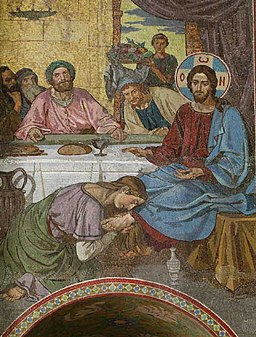Christian Liberty
13th Sunday of the Year (30 Jun 2013)
Homily of Fr. Paul Panaretos, S.J.
In our bibles law translates Hebrew torah. Torah was perceived as much more by the People of the Covenant. Torah was God’s covenant, God’s revelation and God’s wisdom. For Israel all those meanings operated at once. Our word law is not as expansive. Abraham’s descendants heard the book of the covenant; they saw it processed in the synagogue from its throne; they pondered its words and its images, its decrees and its chronicles: all those allowed them to sense God present and inviting them to live transformed lives.
 The book of that covenant, the Sacred Writings of Israel, revealed God’s creating power, God’s restoring power. The people Israel had an expression for their Sacred Writings revealing God’s creating, restoring power.: if it’s not in scripture, it’s not in the world. The maxim continued to be used after the rabbis because it is found translated from Hebrew into Latin.1
The book of that covenant, the Sacred Writings of Israel, revealed God’s creating power, God’s restoring power. The people Israel had an expression for their Sacred Writings revealing God’s creating, restoring power.: if it’s not in scripture, it’s not in the world. The maxim continued to be used after the rabbis because it is found translated from Hebrew into Latin.1
This principle of the rabbis helps us appreciate that torah was considered ultimate. In practice: judge everything according to it; measure everything according to it. Could it be possible that torah, God’s revelation clothed in human words, was not ultimate, that something had taken its place? That was the question in the Galatian church St. Paul had begun. Earlier it had been his personal question.
Paul had been raised to be zealous for torah, and he knew it well. He had been trained as a Pharisee.2 He measured everything according to God’s word clothed in human words.It even led him to persecute the church as a mistaken Jewish sect, which worshiped the crucified Jesus as God’s messiah of all things!
In the act of persecuting Jesus in the infant church, the Risen One met Paul along his way. He met Jesus as God’s messiah. More, he came to know Jesus as the measure of everything, even torah, God’s word clothed in human words. One can sense that liberated St. Paul. He expressed that freedom in his Letter to the Galatians. No more a slave to torah, Paul was yoked to the Risen One: Risen Jesus accompanied him with power and protection unlike before. The companionship of Risen Jesus with him moved St. Paul to announce to all the freedom he had experienced so all might share it.
Christian liberty—a phrase which helps us not confuse our understanding of our national freedom with the freedom Risen Jesus offers—empowers us with new qualities of mind and character. It also empowers us to exercise those qualities. The origin, norm and guide to live the new ways of Christian liberty cannot be found in torah or in any human power. God’s Spirit is the origin, norm and guide to live these new ways: in the words of St. Paul, to whom this was revealed by the Risen One, “guided by the Spirit, [one is] not under torah.”
Jesus’ Spirit creates in us the pattern of our Messiah, both his human dispositions and his risen life. By the Spirit we live the master story Jesus. We live it as we live the way Jesus embodied God’s desire for the people of the covenant You shall love your neighbor as yourself.3 St. Paul compressed the master story of Jesus in five words: through love serve one another. Near the end of Galatians he was more specific: Bear one another’s burdens, and in this way you will fulfill the [torah] of Christ.4
 In Risen Jesus we enjoy his liberty, our Christian liberty. Even as we enjoy it, we always fight against powers, which seek to seduce us to separate ourselves from it. This is what St. Paul meant by the flesh: live by the Spirit and you will certainly not gratify the desire of the flesh. St. Paul did not mean by the flesh a narrow category of human existence or only sexual behavior. By the flesh he meant promoting oneself as powerful or important. That’s always our predicament, isn’t it? It’s a lonely one, too. Self-promotion like that risks trying to negotiate life by my power alone. Christian liberty recognizes that human power is limited. Christian liberty recognizes God’s limitless power in doing something altogether new in Jesus. Christian liberty rejoices that by his dying and rising Jesus gives us his Spirit so we may share already his risen life as well. Christian liberty looks forward to sharing Jesus’ risen life fully when he returns.
In Risen Jesus we enjoy his liberty, our Christian liberty. Even as we enjoy it, we always fight against powers, which seek to seduce us to separate ourselves from it. This is what St. Paul meant by the flesh: live by the Spirit and you will certainly not gratify the desire of the flesh. St. Paul did not mean by the flesh a narrow category of human existence or only sexual behavior. By the flesh he meant promoting oneself as powerful or important. That’s always our predicament, isn’t it? It’s a lonely one, too. Self-promotion like that risks trying to negotiate life by my power alone. Christian liberty recognizes that human power is limited. Christian liberty recognizes God’s limitless power in doing something altogether new in Jesus. Christian liberty rejoices that by his dying and rising Jesus gives us his Spirit so we may share already his risen life as well. Christian liberty looks forward to sharing Jesus’ risen life fully when he returns.
In your daily 15 minutes with Jesus this week
- Pause to become aware of the Trinity with you.
- Ask St. Paul to present you to Jesus.
- In your words praise Jesus for pouring his Spirit into your inmost self and recreating in you the pattern of his living, dying and rising.
- Ask Jesus to increase your desire for his attitude and to live it more readily.
- Close saying slowly the Lord’s Prayer. Jesus’ phrase, daily bread, on our lips reminds us that we live by the empowering nourishment of God at each moment and not by our puny, human power.
Link to this homily’s Spiritual Exercise
____________
- non in tora non in mundo
- See Philippians 3.4-6 for Paul’s self-description.
- Leviticus 19.18. Jesus emphasized these words in Matthew 22.39 and Luke 10.27. St. Paul even said this law of the Messiah is the fulfillment of torah (Romans 13.8-10).
- Galatians 6.2.
________________________________________________________________
Wiki-images of Elijah and of 11th C manuscript page of Letter to the Galatians public domain in the U.S.





